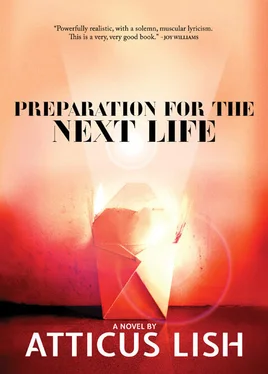They would be sick, their own food would make them sick, bacteria in the water, unidentified meat on the tables along the surfaced road, flies and blood. No imams in the countryside; there was avian flu, malaria, and schistosomiasis. The whine in your ear whenever you dropped off. You smacked yourself. Scabs all over from scratching the bites. Her mother would not eat pork. They would squat in the wet village latrines next to the other girls. Fish in the scummed ponds. They would eat fish when they could get it, a farmer stepping on a live bream on the mud-covered floor of the bus. Her mother would have to ride the back of a motorbike with arms around a mototaxi man’s waist. There would be dogs in the roadway, a dead goat lying in the trash pile where she hunted for paper and plastic. They would eat lamb sometimes, mainly cabbage, cooking with round coal bricks, which they would gather, the half-burnt ones, whenever they found them. Mustard greens and potatoes and white rice and the bones of anything besides pork.
From the factory, where they could not tolerate being locked in for their own protection, it was a short step to having nothing, to living in the brigade field, collecting paper and plastic for recycling. There would be no way to pay the fee for her mother to go to an infirmary. A lot of girls would have gone to work at the KTV bars to sing and drink with Party cadres, but at two in the morning, Zou Lei would gather beer bottles amid the litter of Styrofoam bowls dripping with chili oil and the throwaway chopsticks under the woven plastic tenting and the still-burning light bulbs strung over the unpaved street, then travel a kilometer back on the mud road with just a sense of the walls and huts in the blackness, turning into the paddy fields. Piles where the farmers dumped their shit. The horrible shit-stink in the dark. Stopping to set the clanking weight down, all alone on the mud lane that led out into the giant squares of water.
If you wanted heaven, they would say, maybe you shouldn’t have come. There’s always America, if you think your feet will carry you. She met her mother in the crowd coming out of a mosque. They went to Liberation Boulevard and there were peasants, the sons of nomads, pulling enormous wooden wagons through the broken street. Desert people with gold teeth and leathery hands and faces. Men in white skull caps and dark suit jackets holding up flatbread, saying it is for sale. There were tubs of dates and nuts, watermelons cut open, the red flag of a butchered lamb hanging up, the spokes of cartwheels interlocking through the legs of people walking through the square, interlocking and scissoring, a hundred crossings. The late afternoon sun reflected off something bright at the edge of a mosaic fountain, one side for men, one side for women to wash their feet. A pair of cops with large oiled heads like seals went by.
Her mother was recounting to her what the imam had said in his sermon. The loudspeaker said, If you suspect fundamentalism, tell your leaders. Zou Lei nodded at a group of young men and boys in tracksuits. One had a boa constrictor hanging around his neck, mirrored sunglasses, no shirt.
Who are they?
The children of the police.
She saw razor blades and hypodermics in a bucket under a cart where her mother was buying apples. Zou Lei went up to the snake and touched it, the smooth, beaded surface slipping under her fingers.
You cannot ask for the things of this life, her mother said.
They went back to where they lived in a stinking concrete room next to a latrine, lay down in the same bed and couldn’t sleep. She was going to learn to march. She was going to practice in the field.
In the night, she woke up. The bare bulb was on and her mother was turning in circles. She was chanting into her hands, her hair undone and swinging out, almost touching the wall. Zou Lei watched her mother spin, get dizzy and stagger. I’m on my horse. I’m in the larches. Zou Lei tried to get her back in bed. She claimed to have seen a stag. Zou Lei reached for the switch. They’ll charge us for the light.
I went a thousand miles, her mother said. I should be weary, but I’m not.
She got back in bed, fending off her daughter with her thick strong hand.

They went to court. It had a brown carpet. Someone told her to stand your ass up. A white woman in a pinstriped skirt with a manila folder said, The people have no objection. No one told her why. Later, they just told her she was leaving. Pick your things up there, the deputy pointed. A paper bag with her jeans in it sat on the counter. She took her clothes and changed under the fluorescent light, not counting her money until she got outside. They buzzed the glass door open and she went out past the bulletin boards, the thumb-tacked notice that said To See Your Prisoner in four different languages, and out towards the open space of the small city — it was seven in the morning — the train tracks, barbed wire, and the water.
On the bus, she leaned her head against the glass to watch them leaving town. They traveled past the peeling houses, His Grace of Healing. It was cheaper than the MetroNorth. The driver, on the PA, looked in the rearview. There’s no smoking, thank you. The drifter in a black cowboy hat, a swastika on his neck, said, Ya got a light? At Roy Rogers everyone else got back on eating except for her. She closed her eyes on 95, hearing someone’s headphones. When she opened her eyes, they were rolling through projects, and there were cops with web gear and soldiers with assault rifles in the Port Authority.
HE GOT PICKED UP before it was light, down where there were trees dark and arrow-shaped along the highway.
You goin AWOL? the driver asked.
That’s what I should have done, Skinner said.
The sun broke and irradiated them in the cab. It painted the endless forest along the highway in cherry light. He watched it happen. Slowly the highway curved like the arc of a planet. Sitting high over the road in the cab. The big steady noise.
He was not a big guy, but he had a large skull and hands, which made him seem bigger than he was. He put his boot on the dash without asking if that was okay. The driver had the interior of the cab upholstered in velvet and chrome.
You live in here?
Only when I’m away from home, the driver said and went through the production of showing him a photograph of his kids and his plain blond wife, posed in front of a swirly background. That’s Kyle and that’s Connor. I live for them. My boys are my whole life.
Skinner dropped the photograph on the dash. The driver picked it up with his pale red-freckled hand and put it away in his folding wallet.
You plan on stopping at all?
For what?
For Mickey D’s or something?
I don’t eat until I get where I’m going.
Must be a hardass.
Call it what you want, the driver said.
Skinner had bothered the driver somehow. The driver told him: You got two ways you can do this. I can either keep going or I can stop. If I have to stop, you can thumb a ride with somebody else.
Whatever, Skinner said. Do what you feel.
Skinner put his other boot on the dash and watched the road. Lit a cigarette. He put his shades on. Behind his shades, his eyes went from the cars to the roadside to the side mirror and back to the cars. The traffic increased as they travelled north. He put his feet on the floor and sat up. The landscape changed to bare trees and brown hills. He lit another cigarette. Both he and the driver smoked, the radio playing country.
A black car overtook them, cut around in front of them, and went speeding on ahead, weaving in and out of other cars. Skinner’s jaw flexed. He started jiggling his foot.
Читать дальше













